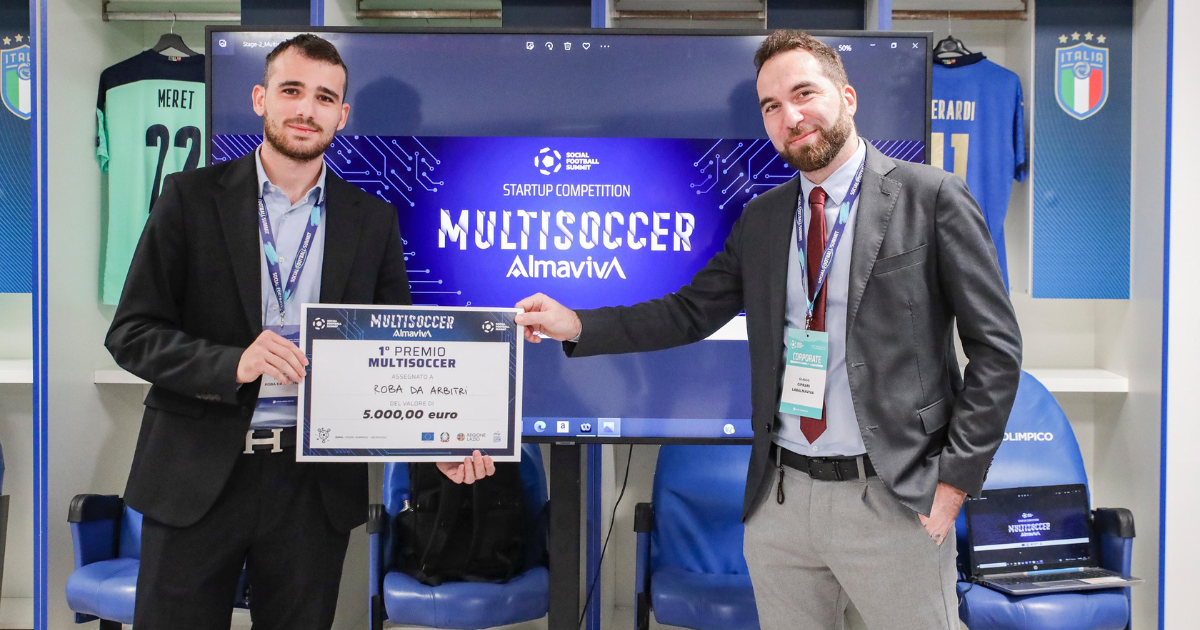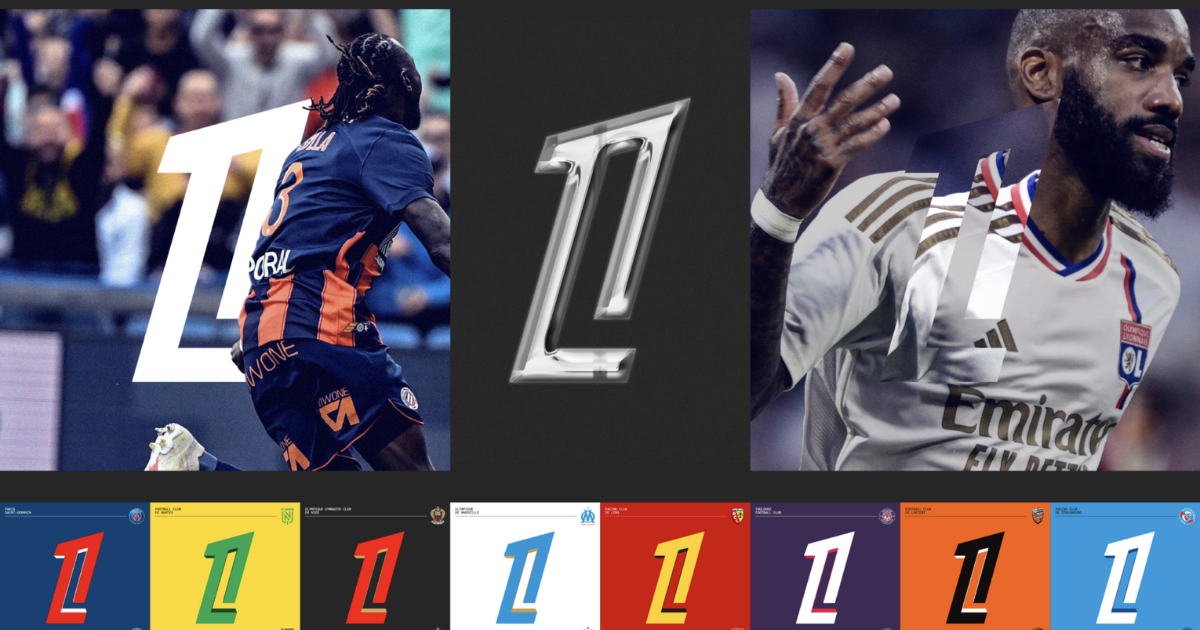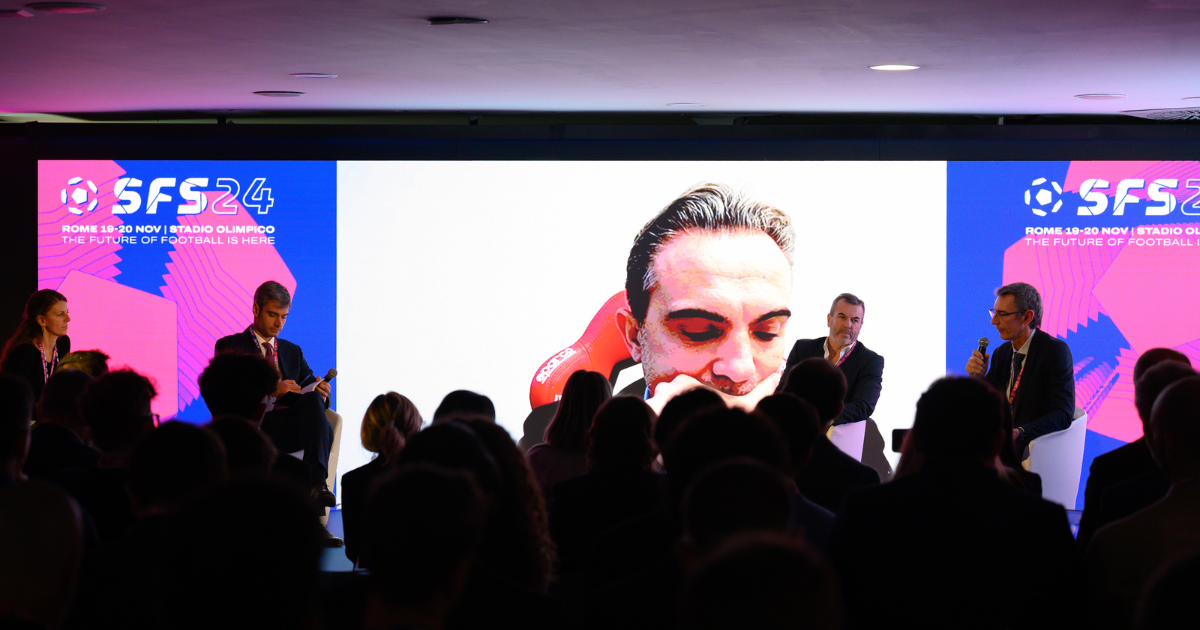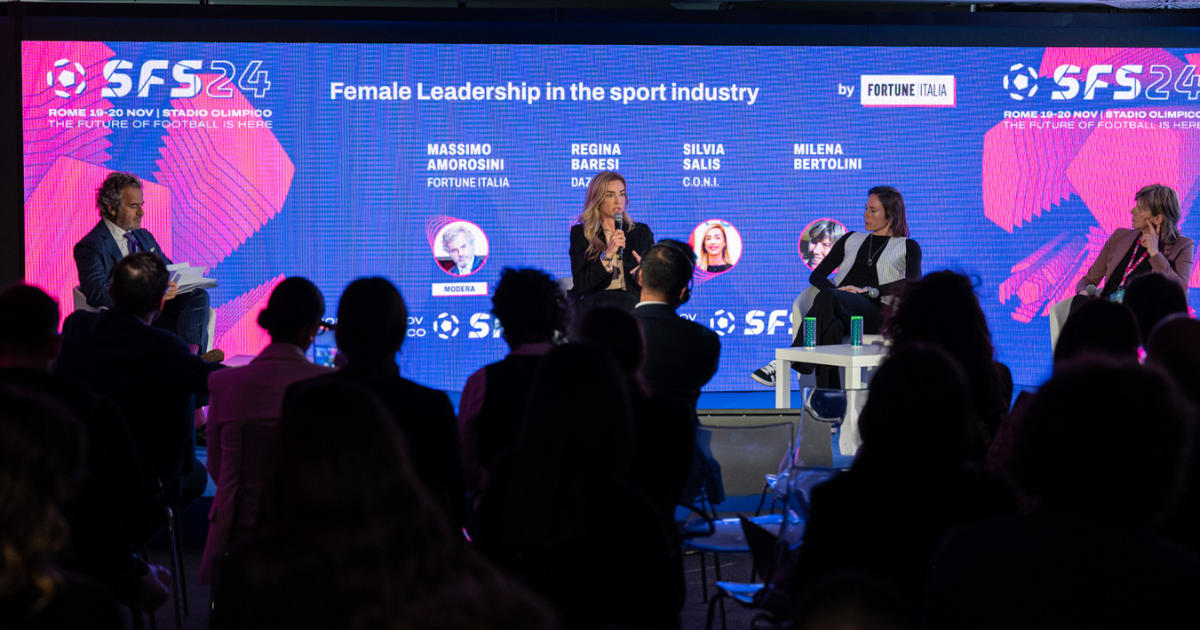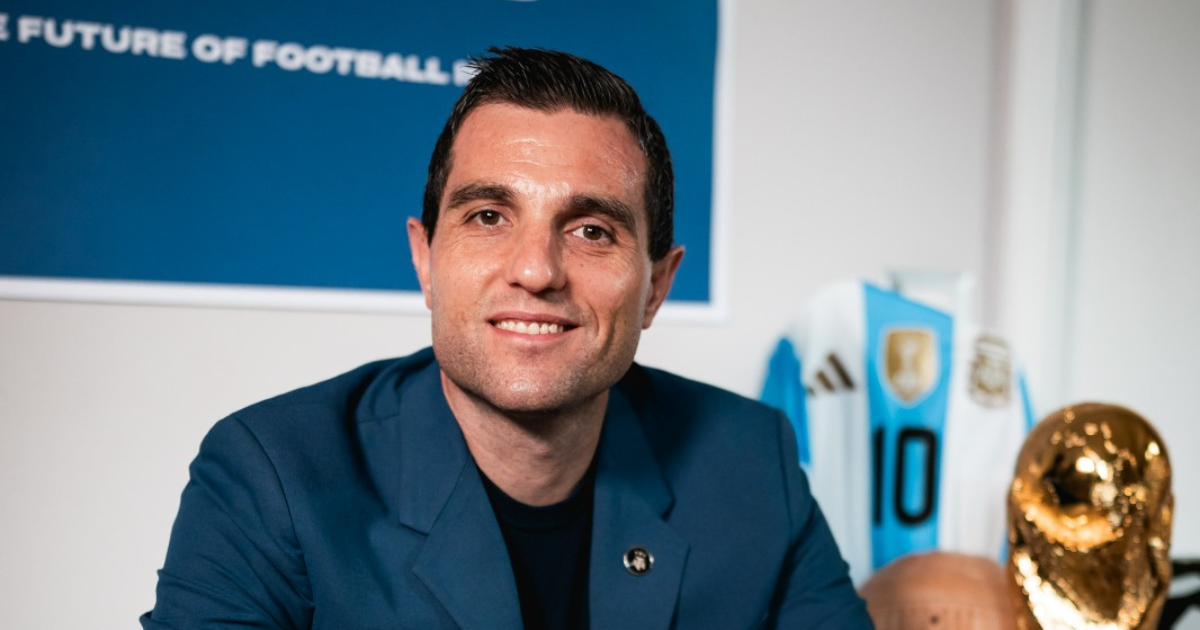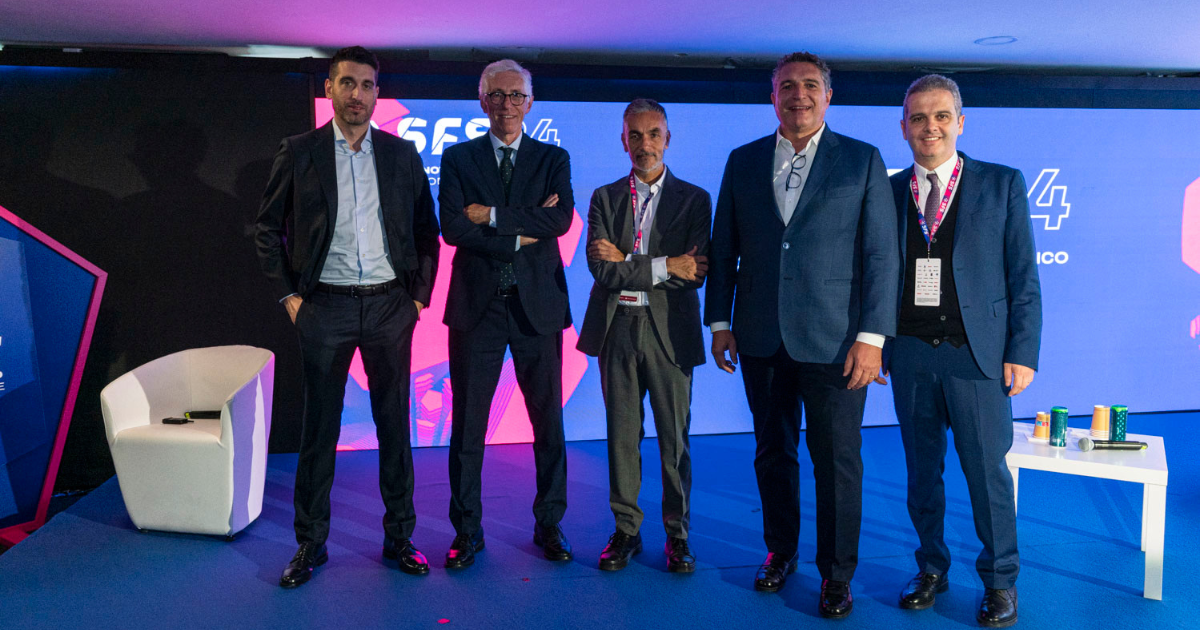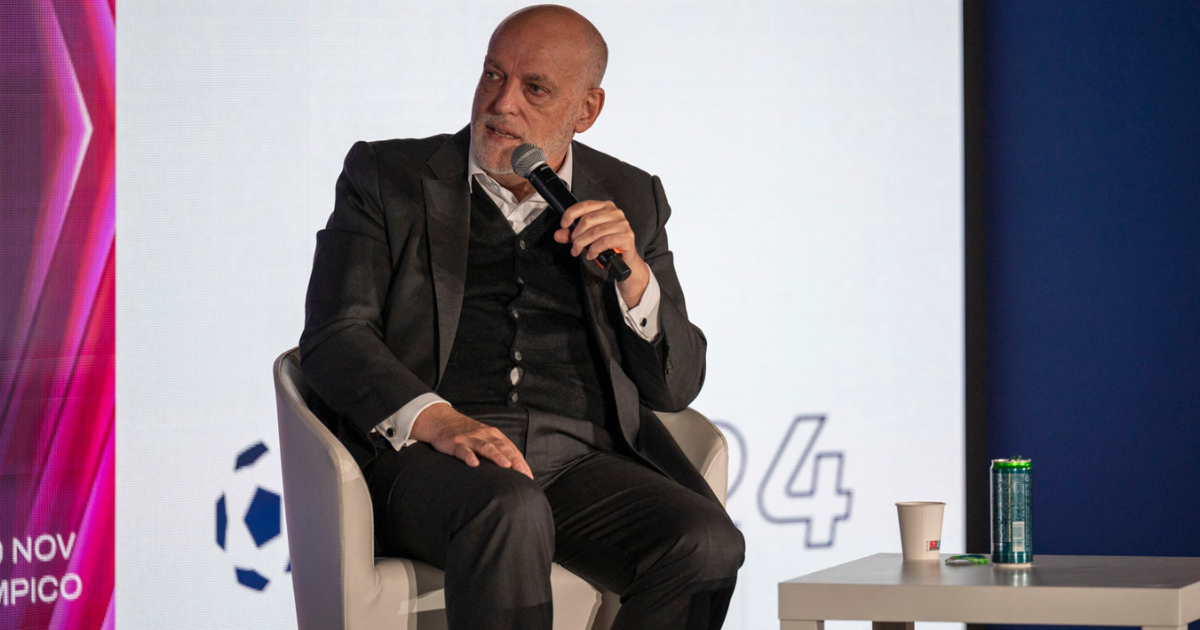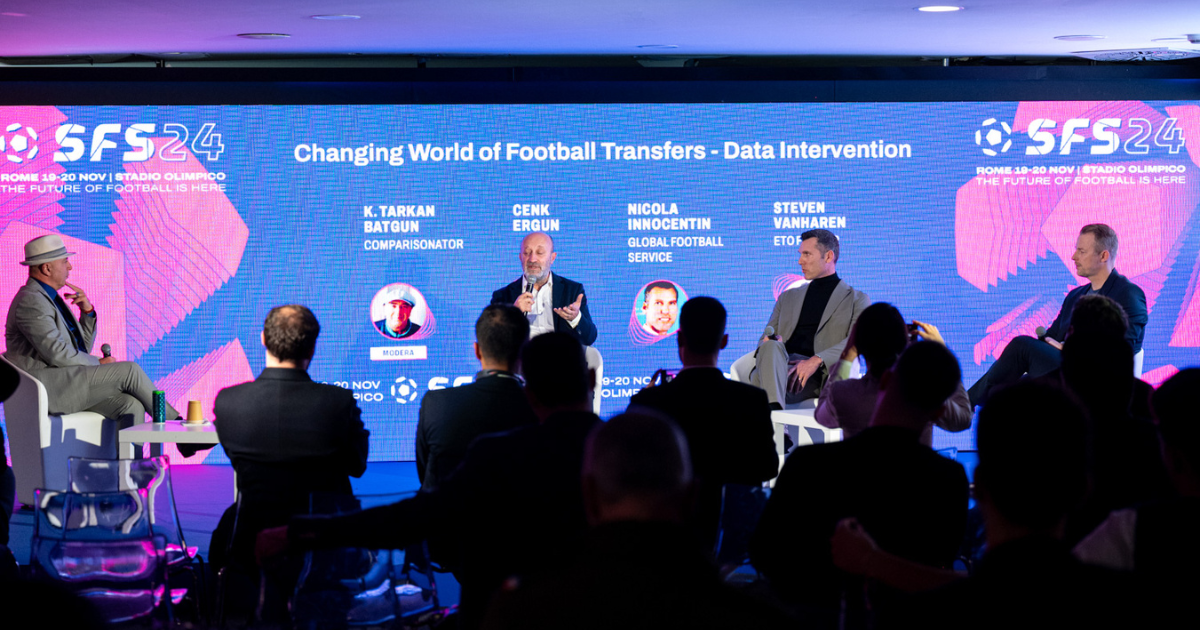Giuseppe Totaro and Rasoul Abdulzahra are two referees ready to revolutionize one of the most controversial categories, often at the center of debates and headlines in major media. We at SFS know them well: they were awarded during the 2022 startup competition when their creativity and innovative vision already stood out. Today, the spotlight is on them again, thanks to Ref House, an ambitious project now close to its big launch. We reached out to Giuseppe, who gave us an exclusive interview, sharing the steps taken after winning the Innovation Tour and revealing their upcoming goals.
If you had to describe Ref House in three words, what would they be?
“Data, justice, and training. Data because we use them, and they are the foundation of our revenue model. Justice because one of our goals is to bring more fairness and objectivity to decisions in every category. Training because Ref House was designed as an educational tool for both referees and football enthusiasts who want to deepen their knowledge but don’t have the right tools”.
Let’s rewind to SFS22, the year you won the startup competition. What steps led you to develop Ref House? What features does it offer today, and how did you go from a demo to the final version?
“That’s right, we won the startup competition in 2022. We had just started developing the software, although the idea was born in 2020. In 2021, we decided to join an incubator. From that moment, we began developing the MVP (Minimum Viable Product), which we released in May 2023 with an annual subscription. Initially, it was an exclusive training tool, although we intended to expand the user base.
Thus, at the beginning of 2024, we developed the mobile version, which was completed in September and officially launched at the end of November. We’ve been on the app stores since November 27, and today we boast 10,000 downloads. 85% of the users are referees, 10% are enthusiasts, and 5% are referee observers or managers“.
Earlier, you mentioned your revenue model and data. Could you elaborate?
“As anticipated, Ref House’s revenue model is based on data analytics. We work with federations, providing them with a customized clone of the app they use as a communication and training tool. We started with the Greek federation, the first in Europe to adopt this digital solution. We offer the app for a fee, allowing access to advanced data and continuous monitoring of each referee’s performance through detailed reports.
For instance, if in Rome, out of a sample of 10,000 referees, 7,000 have downloaded and actively use the app, the federation manager can analyze the data and assess the preparation of individual referees. Referee training today is based on capturing the real needs of the refereeing community, using a video database with over 1,000 analyzed game situations. Additionally, with our app, referees can be assigned to matches, and referee managers can perform their tasks with up to 60% less time”.
How do you promote the app on social media, and what marketing actions are you taking? Do you plan to use influencer marketing or collaborations with famous football personalities to increase visibility?
“We are already negotiating with some high-level referees. Thanks to our collaboration with the Greek federation I mentioned earlier, we’ve built a relationship with Paolo Valeri, VAR Project Leader, who has shown great interest in our current and future activities. His support is incredible, as is his experience and cultural influence. However, the world of referees is delicate: federations restrict testimonial use in terms of image, at least in Italy. Abroad, it’s much easier, which is why in April, we will announce two major partnerships with prominent figures”.
Does Ref House use specific technologies, such as artificial intelligence or gamification systems, to make learning more engaging?
“Absolutely. Gamification is found in a leaderboard updated daily, with personalized prizes or experiences for the top three, thanks to our partners like Macron and other internationally renowned brands. As for artificial intelligence, we have already developed two tools that we will release soon. One of them is Ref GPT, an AI that answers regulatory questions with up-to-date information. We trained it with user-generated data, achieving a 99% accuracy rate in responses”.
How do you differentiate communication for professional and amateur referees?
“The content is tailored based on the category selected during onboarding. After downloading the app, users can choose the profile that best matches their experience and category. They can then select their section, reference city, and other relevant data, which allows us to filter users by location and conduct statistical studies. For example, by comparing Lazio and Lombardy on the percentage of fouls committed, we can see that the threshold is lower in the latter.
These data are then used in various ways. We also track reimbursements, kilometers traveled, and much more. With artificial intelligence, we can personalize training plans and suggest areas where users should focus more”.
Can I ask for your thoughts on the Italian refereeing community? Can Ref House support a category often targeted by criticism?
“Ref House has several missions. For referees, the goal is to help federations train future refereeing classes, giving them an in-depth knowledge of the rules and a better understanding of football (thanks to the over 1,000 episodes analyzed and available in the video hub).
For the football world in general, we want to break down prejudices and common ideas about referees. Thanks to artificial intelligence, we analyze matches in real time. We are practically developing a digital referee that makes decisions based on past analyzed episodes, helping VAR operators with suggestions on procedures and solutions.
Knowledge also improves the relationship between teams, players, and referees, democratizing the sector and bringing in more people. Moreover, many federations suffer from a shortage of referees in lower leagues. Our app also attracts enthusiasts and players who might decide to become referees in the future thanks to the content they find within the app”.
Do you have competitors in the market?
“No, as far as recruitment is concerned, we are the only ones in the market. However, we do have some competitors in the training activities with federations, but we stand out for the 360° vision we offer. Other players just upload videos to a platform and share them with members.
In April, we will launch our first investment round on the business side, involving top figures in the football industry, from managers to former players of major clubs. 2025 will be a turning point, thanks to the numbers we are achieving and our community, Roba da arbitri, which has over 160,000 followers and about one million impressions recorded. We have also already provided support to the Goa7 League and the Kings League”.
To conclude, can you share your thoughts on SFS?
“My first edition was in 2021. It was an exciting discovery, and from that moment on, I decided to participate the following year as well. After winning in 2022, we realized that the football world truly needed such an event. SFS represented a key moment of awareness that broadened my vision of the football industry, and I am still in contact with many participants of the Summit”.
Ref House, Refereeing 4.0: From SFS22 to the New Rules of the Game
Giuseppe Totaro and Rasoul Abdulzahra are two referees ready to revolutionize one of the most controversial categories, often at the center of debates and headlines in major media. We at SFS know them well: they were awarded during the 2022 startup competition when their creativity and innovative vision already stood out. Today, the spotlight is on them again, thanks to Ref House, an ambitious project now close to its big launch. We reached out to Giuseppe, who gave us an
“Football. But French”: The Ligue 1 Rebranding and the Challenge of Sporting Identity
French football has decided to change its look. With the launch of the "Football. But French." campaign, Ligue 1 has embarked on an ambitious rebranding operation aimed at redefining its positioning in the international football landscape. This is not just a new visual identity—it is a cultural statement. French football seeks to be distinctive, elegant, and authentic, without following the narratives set by other top European leagues. The New Visual Language of Ligue 1 One of the most striking changes is the
Oxford United Delivered a Masterclass in Rebranding Its Visual Identity
The London-based agency LoveGunn collaborated with the club to design a new visual identity, aiming to merge its historical and cultural heritage with future commercial aspirations. The world's most prestigious university and a dynamic new partnership with the LoveGunn studio—Oxford United, a club competing in the Championship, has launched a rebranding initiative to expand its commercial strategy and reach a new audience. The Club's visual identity The visual project presented by LoveGunn draws inspiration from the city's historic architecture, referencing the spires of
The stadium of the future: business, technology, and relationships in an evolving ecosystem
The modern stadium is no longer just a simple arena dedicated to sports but a continuously evolving ecosystem capable of integrating business, entertainment, and relationships. This was the central theme of the panel at SFS organized by Infront, featuring experts such as Javier Doña (Senior Stadia and Sports Management Advisor – Grandstand JD), Rolando Favella (Udinese), Alessandro Giacomini (Infront), and Stefano Deantoni (Infront), key figures in the management and innovation of sports facilities. The discussion highlighted how stadiums have become true
SFS24, The value of female leadership football
The last panel of the second day of SFS, in collaboration with Fortune Italia, shed light on female leadership in sports, exploring experiences and strategies that have contributed to transforming the sector. In recent years, the role of women in football has become increasingly significant, with tangible progress yet still many challenges to overcome. The panel featured prominent figures from the Italian sports scene: Silvia Salis, Vice President of CONI, Milena Bertolini, former head coach of the Italian women's national team,
SFS24 REPORT: LET’S TALK NUMBERS!
Once again, SFS has established itself as an unmissable event for the football industry, attracting an ever-expanding B2B audience. 2024 has been a year of remarkable growth for the event, both in terms of participation and impact, cementing its position as one of the most authoritative platforms for networking and innovation in the sports industry. An incredible milestone, made possible by the 70+ partners who believed in this project! The Stadio Olimpico in Rome welcomed over 4,000 attendees, including professionals, managers, and
SFS INSIGHT: EXCLUSIVE INTERVIEW WITH LEANDRO PETERSEN
Leandro Petersen, Chief Marketing Officer of AFA (Selección Argentina de Fútbol), was one of the key figures at the SFS, where he shared his vision on the transformation of the Argentine Football Federation. In an exclusive interview recorded at the SFS studios, he delved into the pillars of AFA’s commercial growth, exploring how digital innovation, economic strategies, and global impact have reshaped Argentine football. Since joining the federation before the 2018 World Cup, Petersen has led a strategic transformation that has
Exclusive SFS24: the Serie A festival presented
During SFS24, Lorenzo Dallari (Editorial & Social Director of Lega Serie A) and Luigi De Siervo (CEO of Lega Serie A) presented the upcoming edition of the Serie A Festival, an event designed to bring Italy’s top football league closer to the general public. The festival offers a space for dialogue, discussion, and the celebration of football in all its facets. The event, created with the goal of showcasing Serie A in an innovative and accessible way, will take place from
Javier Tebas at SFS: the future of La Liga between financial fair play, piracy fight, and global growth
The president of LaLiga, interviewed by Sky Sport journalist Giorgia Cenni at SFS24, discussed economic sustainability, global expansion, and threats like online piracy, outlining the strategic vision for Spanish football. At SFS, Javier Tebas, the head of the Spanish league, provided a detailed overview of the challenges and opportunities facing Spanish football and, more broadly, the international football landscape. La Liga has long been a benchmark for sustainability and sporting success. Over the past ten years, Spanish teams have dominated on
SFS24: The Importance of Data in the Football Industry
The Changing World of Football Transfers Data Intervention, one of the most anticipated panels of the seventh edition of the SFS, offered an illuminating insight into the impact that artificial intelligence (AI) and data analysis are having on football, particularly in scouting and transfer processes. Some of the industry’s leading experts took the stage: Cenk Ergun, former Sporting Director of Galatasaray, Nicola Innocentin, CEO of Global Football Service, K. Tarkan Batgun, CEO of Comparisonator, and Steven Vanharen, Technical and Sporting Director



